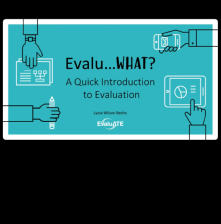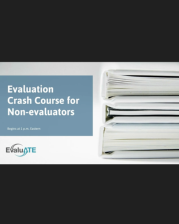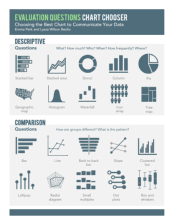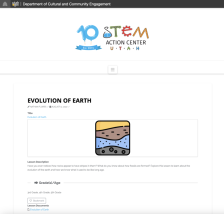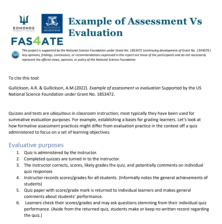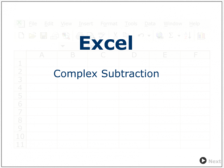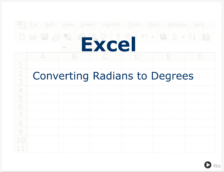Browse Resources
(4 classifications) (749 resources)
General Advanced Technological Education
| Evaluation (194) Learning research (193) Recruitment (87) |
Teacher preparation (49) |
Resources |
|---|
This video, published by EvaluATE: Evaluation Resource Center for Advanced Technological Education, is a brief crash course on evaluation for National Science Foundation (NSF) Advanced Technological Education (ATE) grantees who are new to evaluation. The video provides an introduction to evaluation,...
This 36-page packet, provided by EvaluATE: Evaluation Resource Center for Advanced Technological Education, features a collection of resources for pre-award National Science Foundation (NSF) Advanced Technological Education (ATE) grant seekers. Resources consist of different templates, checklists,...
This webinar, published by Western Michigan University Evaluation Center, discusses evaluation for beginners. This presentation also serves as a refresher on the basics of evaluation. In the video, Lyssa W. Becho outlines a fictional scenario where an individual has an idea for an ATE proposal. To...
The Chart Chooser, provided by EvaluATE: Evaluation Resource Center for Advanced Technological Education, is a 2-page guide that provides assistance in determining what type of chart best communicates data based on the evaluation question. The guide is split up into the following evaluation question...
This activity, from the STEM Action Center - Utah, teaches students about the evolution of Earth. The activity is intended for 3rd through 5th grades and includes the aligning UT SEEd Standard. During the activity, students watch an "... animation about how layers in the earth form and how they can...
This 2-page document, from Edmonds Community College, provides examples of the differences between the purpose of assessment and evaluation. This resource is part of the Professional Development Formative Assessment System (PD-FAS). PD-FAS was created by the Formative Assessment for Advanced...
In this animated and interactive object, students view the steps for adding complex numbers in Excel.
In this animated and interactive object, students view the steps for multiplying complex numbers in Excel.
In this animated and interactive object, students view the steps for subtracting complex numbers in Excel.
In this animated and interactive object, students read how to use the DEGREES() function to convert radians to degrees.
|
| ← PreviousNext → |
